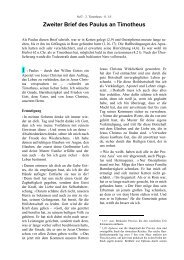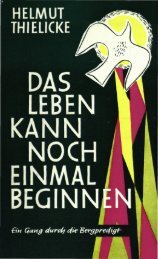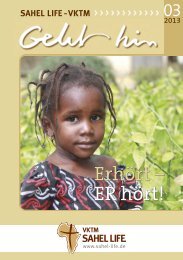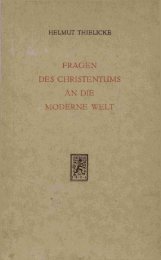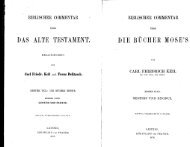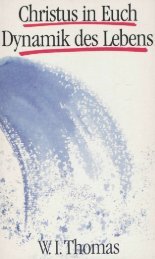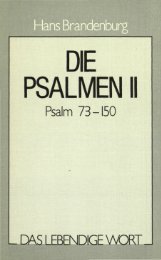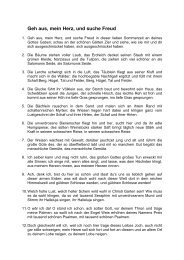Create successful ePaper yourself
Turn your PDF publications into a flip-book with our unique Google optimized e-Paper software.
Genesis 1:28: “God blessed them and said to<br />
them.” God spoke to Adam and Eve. Man is<br />
addressed by God, and is called to respond. No<br />
animal can speak! Only two exceptions are mentioned<br />
in the Bible, the serpent in the garden of<br />
Eden, and Balaam’s ass. But both of these animals<br />
were controlled externally; the serpent by<br />
the devil, and the donkey by God.<br />
Only man has the gift of speech, a characteristic<br />
otherwise only possessed by God. This separates<br />
us clearly from the animal kingdom. We are able<br />
to use words creatively, but we are unable to create<br />
anything by speaking, as God can do. <strong>Our</strong><br />
words can bless and benefit other people, but<br />
they can also be destructive. We are able to<br />
express all our feelings in words, and we can<br />
enter into trusting relationships like no other<br />
beings on Earth. In addition to the necessary<br />
“software” for speech, we have also been provided<br />
with the required “hardware”:<br />
The morphological conditions for speech are not<br />
located in a single organ. We require a voicebox<br />
(larynx) for producing sounds, a suitably shaped<br />
throat and mouth working together with the<br />
tongue, as well as a highly complex control system<br />
(the brain), all functionally coordinated with<br />
each other. If only one of them is missing, speech<br />
is impossible. In the Middle Ages, peoples’<br />
tongues were cut out to prevent them from talking.<br />
The sounds produced by the vocal cords<br />
travel upwards and are shaped in the throat and<br />
mouth to form specific phonemes (speech<br />
sounds). This requires movements of the tongue,<br />
fine-tuned with those of the lips. In addition,<br />
various resonant passages of the oral cavity contribute<br />
to the formation of understandable<br />
sounds. Each and every one of the 600 possible<br />
sounds occurring in the different human languages<br />
requires precise movements and exactly<br />
shaped tongue positions. In 1756 Johann Peter<br />
Süßmilch (1707 – 1767) established that man<br />
could not have invented speech without the<br />
required mental abilities, and, conversely, that<br />
thought in its turn depends on the previous existence<br />
of speech. The only possible solution for this<br />
paradox is that God has given man the ability<br />
to speak.<br />
Characteristics of human speech:<br />
– We can create new words and can link as<br />
many discrete phonemes together as we like,<br />
producing acceptable new sentences.<br />
– We are able to construct sentences which we<br />
have never before uttered.<br />
– We can understand sentences which we have<br />
never heard beforehand.<br />
– An unlimited number of thoughts can be<br />
expressed in human speech.<br />
Systems used for communication among animals<br />
are fixed and limited. No creative communion is<br />
possible, and only severely limited concepts can<br />
be expressed (for example food, danger, and sexual<br />
attraction). These cannot be compared to<br />
speech.<br />
Like God, we can think<br />
God is the source of all thought. No one advised<br />
Him, since wisdom originates with Him: “Oh, the<br />
depth of the riches of the wisdom and knowledge<br />
of God! How unsearchable his judgments,<br />
and his paths beyond tracing out! ’Who has<br />
known the mind of the Lord? Or who has been<br />
his counselor?’ ” (Rom 11:33-34).<br />
God compares his thoughts with ours in Isaiah<br />
55:8-9: “ ’For my thoughts are not your thoughts,<br />
neither are your ways my ways’, declares the<br />
Lord. ’As the heavens are higher than the earth,<br />
so are my ways higher than your ways and my<br />
thoughts than your thoughts’.”<br />
However, despite this enormous distance from<br />
God, we too can think, consider, and contemplate.<br />
We are able to ponder fundamental issues<br />
such as life, death and wisdom, as stated in<br />
Psalm 90:12: “Teach us to number our days<br />
aright, that we may gain a heart of wisdom.”<br />
We have the ability to handle widely differing<br />
categories of thought, like inferential logic,<br />
causality and complementarity. The following<br />
ability is very important in our daily lives and in<br />
all sciences:<br />
101




